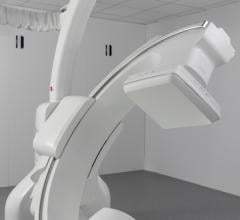March 13, 2019 — An imaging procedure commonly performed before starting cancer treatment can provide valuable clues about a patient's risk for heart problems in the months and years after treatment. However, this information is not always reported and is rarely acted upon in current practice, according to research being presented at the American College of Cardiology's 68th Annual Scientific Session, March 16-18 in New Orleans.
Doctors frequently order a computed tomography (CT) scan, a special type of X-ray imaging that provides a detailed view inside the body, to assess a tumor's size and spread before starting patients on therapy. Even though these CT scans also provide a clear view of plaque buildup in the heart's arteries, the new study found that radiologists only reported this about half the time. If this reporting was done routinely, it could potentially help doctors identify and treat patients who have coronary plaque buildup (an indicator of coronary artery disease) and are at high risk for other heart problems, researchers said.
"This is essentially free information because the patients are undergoing the CT scans anyway, and we'd like to see it reported more frequently," said Matthew Hooks, M.D., a resident physician at the University of Minnesota and the study's lead author. "It would be particularly helpful to know if a patient has evidence of early coronary artery disease before starting cancer treatment that can potentially harm the heart."
Certain chemotherapy drugs and even some of the newer targeted therapies can damage the heart and lead to diseases such as heart failure, especially in people who have coronary artery disease before beginning therapy. The amount of hardening, or calcification, in the coronary arteries, which is visible on a CT scan, is an important marker of heart health. If a person has high coronary artery calcium (CAC), taking medications such as aspirin or statins can help reduce the risk of a heart attack or other heart problems later.
"As cancer treatments have improved and more patients are surviving cancer, we have become more aware of how these therapies might affect patients' heart health in the long term," Hooks said. "We hope to find out whether we can use CAC as a predictive tool to identify patients who may have poor cardiac outcomes and potentially guide the type of chemotherapy they get or guide whether preventative measures should be implemented prior to starting chemotherapy."
In a sample of 1,001 patients undergoing treatment for cancer, the researchers examined how often CAC was reported, and how often patients with CAC were prescribed aspirin or statins to reduce cardiovascular risk. All the patients included in the study underwent a CT scan before starting treatment with an anthracycline drug or trastuzumab, two cancer treatments known to increase the risk of heart problems. The research team examined each CT scan to assess CAC and separately determined whether the CAC had been noted in the original CT report.
They found that 349 patients, one-third (35 percent) of the sample, had CAC. However, CAC was noted in the CT report just half the time. At the time of the scan, a little less than half of patients with CAC were taking aspirin (a blood thinner) or a statin. Very few patients were newly started on aspirin or statins after the CT scan, with just five patients starting aspirin and three patients starting statins. This likely suggests at least some doctors missed the opportunity to use the CT scan to identify patients with high cardiovascular risk and take steps to intervene, Hooks said.
While further research is necessary to determine whether identifying CAC before cancer therapy can help improve long-term outcomes, Hooks said the study underscores CT scans as an underutilized resource that could offer an important first step toward reducing the toll of heart disease in cancer patients.
"The next step is to find out whether these calcifications actually predict which patients may do poorly in the long term," Hooks said. "Once we know that, it can help make a strong case for whether those patients should be treated aggressively with aspirin and statins, for example, which is not happening right now."
Mammograms Offer Insights on Heart Health
Other imaging modalities commonly used for cancer diagnostics could offer insights on heart health as well. In a separate study being presented at ACC.19, researchers found calcification of the arteries in the breast, which can be assessed with mammograms, could be a useful marker to help identify women at risk for coronary artery disease.
The study, which analyzed mammograms and coronary angiograms in 1,150 women, found that women with calcification in the breast arteries were 53 percent more likely to have coronary artery disease than women without breast artery calcification. Since mammograms are performed far more frequently than coronary angiograms, the findings suggest including breast arterial calcification in mammogram reports could help doctors identify women at risk of having coronary artery disease and intervene early, said Rajendra Patel, M.D., lead author of the study conducted at Navicent Health/Mercer University School of Medicine.
For more information: www.acc.org


 February 13, 2026
February 13, 2026 









